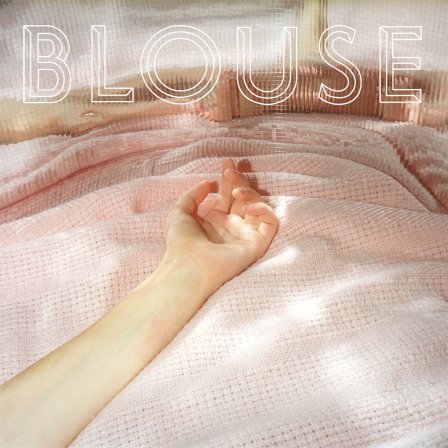It’s to Blouse’s credit that the extent to and precision with which the Portland-based trio successfully emulate the stylistic particularities of a wide swath of primarily 80s-era gothic music ultimately pales in significance to the album considered as a whole. Throughout their self-titled debut, band members Charlie Hilton, Patrick Adams, and Jacob Portrait demonstrate — or perhaps seemingly flaunt — a dauntingly impressive and comprehensive grasp of the goth genre(s). The album’s production is even pervaded by a slight hissing and filmy texture, as if it had been recorded on some cassette tape — it has a delectably engrossing effect, for sure — and yet, frustratingly inexplicably, and therefore fascinatingly so, Blouse is an album distinctly, undeniably, and plainly of the moment, so to speak.
After all, Blouse’s debut does follow a wave of unapologetically goth-inspired acts from the last few years such as Tamaryn, Minks, Kindest Lines, and this year’s Trust, all of whom have largely shed the dark romantic visual aesthetic and theatricality that came to be seen as integral to and inseparable from the subculture, incorporating certain identifiable aspects of contemporary ‘indie’ into both their music and their image. And while Blouse does look more or less like every other ‘indie rock band,’ they come closest to recreating and recapturing the essence(s) of the ‘goth sound’ much more so than any of their like-minded peers — so close, in fact, that all things considered, Blouse may have inadvertently produced one of the most notable, truly unencumbered reflexive turns on the genre (and almost necessarily by extension, its subculture) in recent memory.
It’s especially interesting to hear opening track “Firestarter” for the first time: the dense atmosphere as evoked by the minimalist combination of anhydrous guitar slabs, proto-New Wave-style synths, and tribal drumming is unmistakably in the vein of The Danse Society’s doings, a somewhat lesser-known but still quintessentially ‘goth’ band that, it seemed, should have never expected to find themselves so closely referenced by any current indie rock band. But the whole album plays the same, as if Blouse essentially recorded themselves performing a compilation of gothic rock’s greatest hits. Meanwhile, the following track, “Time Travel,” bears more than a passing resemblance to Siouxsie and the Banshees’ “Red Light,” with its electro-synth pop sound, though it’s propelled by the post-punk energy of their 1978 track “Love In A Void.” And fourth track “Into Black” could almost be mistaken for an unreleased gem from Medusa-era Clan of Xymox, basic and sedate drum machine loops buffering melancholic, Cure-esque guitar hooks and vocalist Charlie Hilton’s breathy, accented vocals.
This is not to say that Blouse confine themselves solely within the limits of what would have been considered ‘goth,’ which, in any case, would be quite expansive and ambiguous. On the album’s fifth track, “Videotapes,” the band shows off their more exclusively European and electronic influences — particularly of the German and Eastern European synth pop varieties — with entrancing wall-of-sound synthesizers that, as accompanied by Hilton’s style of singing, recall at times the New Wave pop sounds of acts such as Nena, Ultravox, and The Human League, but especially by way of the Italo disco style, bringing them closer to the likes of Sally Shapiro or last year’s excellent Soft Metals.
The album’s closing track, “Fountain In Rewind,” showcases the band’s other influences, but in a rather interesting way; its template is more or less derived from the early 90s pop that bands such as Love and Rockets, Cocteau Twins, and Siouxsie and the Banshees had been venturing into. As such, the song would have provided an appropriate coda to a gothic rock-inspired album, were it not for the complex arrangement in percussion, uncharacteristically melodic guitars, and a sung French section, all personal touches by Blouse that render it, even more appropriately, as the fitting ending to a post-goth album in 2012.
More about: Blouse


